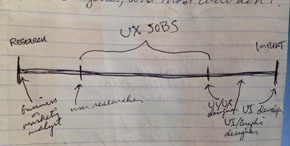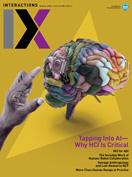Authors: Ashley Karr
Posted: Tue, May 21, 2013 - 11:17:20
Take away: We research to understand the world. We design to change the world. The user experience (UX) professional’s role in any design process exists along a continuum between research to understand the user and designing something that changes, and hopefully improves, the user’s experience.
Defining the problem
If you get an opportunity to have a conversation with Skot Carruth, take it. He is a UX professional and principle at philosophie, a UX and product consulting firm. In addition, he is a fellow UCLA graduate, a smart man, and an all around good person. Happily, we both stumbled upon the same phenomenon: There exists in industry a general lack of clarity and understanding regarding the role of a UX professional. On the one hand, this is unfortunate. We want everyone to know, love, and understand our chosen profession. On the other hand, this is very fortunate. It means, to paraphrase Don Norman, we are leaders in an emerging field, and we have the opportunity to spread the word.
We enjoyed ourselves as we kicked around the questions:
- Is UX a noun or verb?
- Is UX a role you play or a process you champion?
- Where does the work of a UX professional begin and end?
- Where is the intersection of time spent and quality derived in the UX research and design process?
We did not generate sensational answers to all of these questions; however, we did celebrate when we settled on the idea that UX is a continuum—between a role and a process. On the far left, we find UX research, and on the far right, we find UX/user interface (UI) design. Skot drew a very nice picture of our hypothetical continuum. You can look at the picture and/or keep reading to discover what we uncovered during our interesting conversation one balmy Los Angeles afternoon.

The UX research & design continuum, by Skot Carruth
Defining research
To research something is to investigate it systematically. We do this in order to reach new conclusions, establish new facts, and learn as much about the truth as possible. Research also gives us a chance to find problems that we can potentially fix. We research to understand the world.
Defining design
To design something is to create the form and function of an object, system, or interaction. We do this in order to make our experience here on earth (or in space) better, safer, healthier, more comfortable, more fun —and we can create solutions to the problems we found during our research. We design to change the world.
Contemplating the UX job description continuum
As I mentioned previously, Skot and I decided that UX was a continuum. This continuum begins with UX research and ends with UX/UI design. This may explain why there is some confusion regarding what educational background a UX professional should have, what role they should play on a design team, and what part of the design process they should “own.” (I disagree with the concept that someone can actually own a part of the design process, but that is another discussion entirely.) UX professionals with backgrounds in the social or behavioral sciences and or are very adept at gathering and analyzing data are perfectly primed to work as UX researchers. Graphic designers, industrial designers, and engineers who are adept at creating tangible products would then be perfectly primed to work as UX designers.
Of course, these are not hard and fast rules. These are the result of Skot and my attempt to define and organize a very complex, multi-disciplinary field. To broaden our definition, Skot adds:
“I think one unified way to define UX is that it is a perspective—a lens through which you can view your product, service, or organization. It is the lens through which your users view you, as well. In my opinion, anyone who can use this perspective is practicing UX.”
We are curious to hear what other UX professionals think about this phenomenon. We would love to hear how you bring clarity about your role and responsibilities to your design team. Please write your comments below. We look forward to reading them. Until next time, please enjoy the experience.
Posted in: on Tue, May 21, 2013 - 11:17:20
Ashley Karr
View All Ashley Karr's Posts







Post Comment
@Huda (2013 06 11)
I don’t think there’s a right or wrong answer here, because UX as a job field is so vast. In my humble opinion, UX is more of an overlay on top of the design elements. So it’s all the little details that nobody really realizes are important, but that play an important role in the balance of the entire experience.
@Ashley (2013 08 19)
Thank you, Huda! I like what you said about, “all the little details that nobody realizes are important.”
@Omid Amraei (2014 01 17)
It was the most clear answer. UX Researchers are searching the history (past to present) and find what is related to users instinct. While UX Designers are searching for future (present to future) to find what is related to user’s wisdom.
I invite you to read my first article in English.
https://medium.com/p/430f5ca67d82
@usualstairs (2025 06 02)
Published under the Action group of applications, part of Games & Entertainment, Slice Master is a free Android tool.
@emmascott63 (2025 06 06)
Forget realistic graphics or deep storytelling—stickman hook is about one thing: glorious, glorious swinging. It’s like watching a drunken acrobat navigate a jungle gym, and somehow, it never gets old.
@ katelin.moore (2025 06 26)
Jump precisely, skillfully fly through narrow gaps, flexibly flip to avoid obstacles, or slide past barriers in Geometry Dash – every action must be accurate to the millisecond to survive.